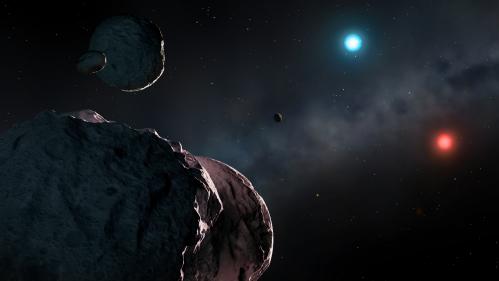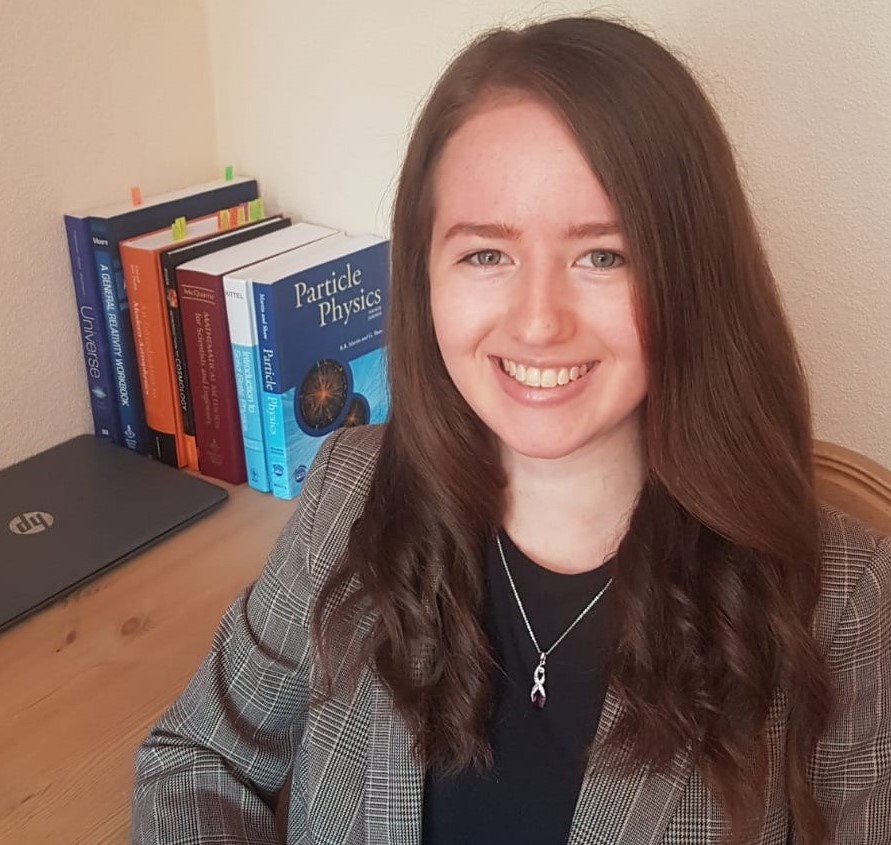Abbigail Elms
I am a Postdoctoral Research Fellow in the Astronomy & Astrophysics group at the University of Warwick, working with Pier-Emmanuel Tremblay and the white dwarf group. My research interests are: ancient white dwarfs with planetary systems; magnetic white dwarfs; and using white dwarfs for HST/JWST flux calibration.
Research
Using photometric data from Gaia and Pan-STARRS and spectroscopic data from the X-shooter instrument on the Very Large Telescope (VLT), I am utilising the local population of white dwarfs to calibrate stellar ages in our galactic neighbourhood.
Specifically, I use advanced white dwarf model atmosphere codes to determine the atmospheric parameters and chemical composition of metal polluted ultra-cool white dwarfs. Very cool white dwarfs tend to be stellar remnants of some of the oldest stars in the Milky Way, so the ones polluted by metals allow us to investigate the remains of their old orbiting planetary systems.
We have recently discovered two ultra-cool metal-polluted white dwarfs [Artist's impression credit: University of Warwick/Mark Garlick]. One white dwarf is unusually blue and was likely polluted by planetary debris of a similar composition to the Earth’s continental crust. The other white dwarf is very red, faint and is the oldest metal-polluted white dwarf in our Galaxy known to date, as it formed over 10 billion years ago.  The accretion of debris from orbiting planetesimals offers an exciting opportunity to research old planetary systems in our Galaxy, as this provides information on the formation and evolution of stars, planets and moons in the Milky Way. Various press releases covered this work, including from the University of WarwickLink opens in a new window and dozens of national and international news outlets.
The accretion of debris from orbiting planetesimals offers an exciting opportunity to research old planetary systems in our Galaxy, as this provides information on the formation and evolution of stars, planets and moons in the Milky Way. Various press releases covered this work, including from the University of WarwickLink opens in a new window and dozens of national and international news outlets.
Publications
First author papers:
1) Elms, A. K., et al. 2022, MNRAS, 517, 4557
Spectral analysis of ultra-cool white dwarfs polluted by planetary debrisLink opens in a new window
2) Elms, A. K., et al. 2023, MNRAS, 524, 4996
An emerging and enigmatic spectral class of isolated DAe white dwarfsLink opens in a new window
3) Elms, A. K., et al. 2024, MNRAS, 534, 2758
Co-author papers:
2) Tremblay, P-E., et al. 2024, New Astronomy Reviews, 99, 101705
The Gaia white dwarf revolutionLink opens in a new window
3) Gentile Fusillo, N. P., et al. 2025, A&A, 701, A269
Collaboration Visits
Space Telescope Science Institute (STScI); Johns Hopkins University, Baltimore, Maryland, US; October 2023
- Talk: A network of cool white dwarfs as standards for flux calibration
Harvard Center for Astrophysics; Harvard & Smithsonian Center for Astrophysics, Boston, Massachusetts, US; November 2023
- Talk: Overview of my PhD research (Professor David Charbonneau weekly group meeting)
Conferences
The National Astronomy Meeting (NAM) 2025; Durham University, UK; July 2025; participant
Accurate Flux Calibration in the Era of Space Astronomy and All-Sky Surveys; Space Telescope Science Institute (STScI), Baltimore, USA; October 2024
- Talk: A network of cooler white dwarfs as infrared standards for flux calibration
EUROWD24: 23nd European Workshop on White Dwarfs; Universitat Politècnica de Catalunya (UPC-BarcelonaTech), Spain; July 2024
- Talk: A network of cooler white dwarfs as infrared standards for flux calibration
UK Exoplanet Community Meeting (UKEXOM) 2024; University of Birmingham, UK; April 2024
- Talk: Oldest white dwarf planetary systems in the Galaxy
Rocky Worlds III; ETH Zurich, Switzerland; January 2024
- Poster: Spectral analysis of ultra-cool white dwarfs polluted by planetary debris
Exoplanet Systems and Stellar Life Cycles: Late-stage and Post-MS Systems; Aspen Center for Physics, Colorado; March 2023
- Poster: Spectral analysis of ultra-cool white dwarfs polluted by planetary debris
Naples Stellar Evolution along HRD with Gaia; INAF-Osservatorio Astronomico di Capodimonte, Naples, Italy; September 2022; participant
EUROWD22: 22nd European Workshop on White Dwarfs; University of Tübingen, Germany; August 2022
- Talk: Spectral analysis of ultra-cool white dwarfs polluted by planetary debris
The National Astronomy Meeting (NAM) 2022; University of Warwick, UK; July 2022
- Talk: Spectral analysis of ultra-cool white dwarfs polluted by planetary debris
Workshops
Sheffield Gaia DR3 Workshop; University of Sheffield, UK; April 2022
Summer Schools
Summer School in Astrostatistics and Astroinformatics; The Pennsylvania State University, USA; June 2022 (two weeks); virtual
STFC Introductory Summer School in Astronomy 2021; University of Hull, UK; September 2021 (one week)
Outreach Talk
Clubhouse - Science Society; New York University, USA; November 2022; virtual
- Talk: White dwarfs and their evolved planetary systems
Observing
Five nights; Roque de los Muchachos Observatory, La Palma; Sept-Aug 2023; in-person
Other Research Interests
I am also interested in galaxies, black holes and general relativity. For my master's research project, I identified all dwarf galaxies in SDSS MaNGA data and determined which of them likely host an active galactic nucleus (AGN). Then, I discovered each dwarf galaxy's local environment to see if there is a correlation between this and hosting an AGN.
Teaching
For the academic years 2021/22 - 2024/25, I was employed as a Postgraduate Teaching Assistant and fulfilled the role of laboratory demonstrator for the first-year undergraduate physics module PX152 Physics Laboratory. Responsibilities involved: guiding students through dozens of different laboratory experiments and practicals; helping everyone to understand the physics and maths problem questions that must be answered to complete the lab; ensuring everyone in my group were following the correct safety procedures; and marking the student's laboratory books at the end of the session, then providing verbal feedback on how they performed during the experiment.
For the academic years 2021/22 - 2024/25, I was also employed as an Exam Invigilator for the Department of Physics at the University of Warwick.
I worked as a secondary school Teach Physics intern for the Ogden Trust in the summers of 2019 and 2021.
Outreach and Other Interests
During my four years at the University of Portsmouth, I was part of the Physics Society and was President in my second year (2018/19) which I used to promote diversity and inclusivity in physics. I was also an Outreach Demonstrator for the Institute of Cosmology and Gravitation, where I regularly performed physics experiments and fun STEM activities to primary and secondary school students to generate enthusiasm for science.
In addition to my interest in physics, I have played competitive netball for 17 years at club, university and county level.

Write to:
Abbigail Elms,
Department of Physics,
University of Warwick,
Coventry CV4 7AL
UK
Contact details:
E-mail: Abbigail.Elms[at]warwick.ac.uk
Office: A1.24 (Millburn House)
